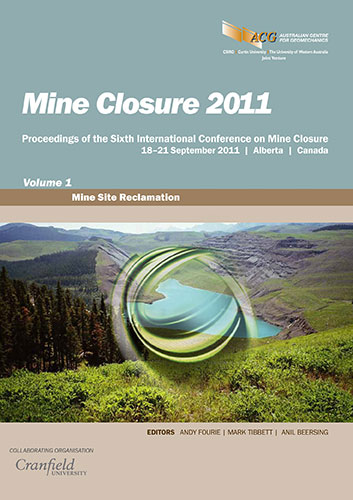Corporate social responsibility and mine closure in Ghana, West Africa

|
Authors: Thorpe, M |
DOI https://doi.org/10.36487/ACG_rep/1152_81_Thorpe
Cite As:
Thorpe, M 2011, 'Corporate social responsibility and mine closure in Ghana, West Africa', in AB Fourie, M Tibbett & A Beersing (eds), Mine Closure 2011: Proceedings of the Sixth International Conference on Mine Closure, Australian Centre for Geomechanics, Perth, pp. 129-138, https://doi.org/10.36487/ACG_rep/1152_81_Thorpe
Abstract:
Golden Star Resources (GSR) operates four mines and two processing plants in Ghana, West Africa with an annual production of about 350 k ounces of gold. As part of the legal requirements within Ghana, every mine must have a rehabilitation and closure plan at the start of operations. This plan is gradually refined as the development continues through to closure. As part of our closure and rehabilitation planning, we complete a series of stakeholder consultations aimed at identifying the post closure needs of our communities. We had recent experience with some closed out areas that were forested that were then cut down by local stakeholders so that they could develop farms. This disturbance of a rehabilitation project makes the final hand over to the Government of Ghana and the Traditional Authorities difficult as there are criteria to be met. The development of a more productive economic base is, therefore, factored into our development and closure planning. We understand that our operations will eventually close, resulting in a reduction in net income in our stakeholder communities. Therefore, we have established an oil palm project on disturbed lands that aims to provide longer-term benefits to our communities post closure. This is, of course, coupled with ongoing infrastructure development that is passed to the relevant government authority for ongoing operation and maintenance (e.g. health clinics, hospital wards and schools). Our closure planning builds on the current experience and involves extensive community consultation. As we advance our projects, we develop a mosaic approach to closure, based primarily on land use capability but aimed at our ongoing corporate social responsibility (CSR) work. We aim to close our tailings impoundments as oil palm plantations, flooded pits as aquaculture and other areas as a mix of farmland and firewood – all of which have been either trialled or tested as part of our ongoing efforts. By building our closure plans into our CSR efforts, we can ensure that our operations leave a lasting positive legacy in Ghana.
© Copyright 2026, Australian Centre for Geomechanics (ACG), The University of Western Australia. All rights reserved.
View copyright/legal information
Please direct any queries or error reports to repository-acg@uwa.edu.au
View copyright/legal information
Please direct any queries or error reports to repository-acg@uwa.edu.au